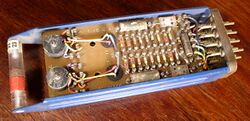Difference between revisions of "TX-2"
From Computer History Wiki
(→External links: Simulation project.) |
m (→External links: +TX-2 Circuitry Handbook) |
||
| Line 16: | Line 16: | ||
* [http://bitsavers.org/pdf/mit/tx-2/ Bitsavers TX-2 documents] | * [http://bitsavers.org/pdf/mit/tx-2/ Bitsavers TX-2 documents] | ||
| + | * [http://bitsavers.org/pdf/mit/lincolnLaboratory/division_6/6D-2631_TX-2_Circuitry_Handbook_Oct1958.pdf TX-2 Circuitry Handbook] | ||
* C. Gordon Bell, Gerald Butler, Robert Gray, John E. Mcnamara, Donald Vonada, and Ronald Wilson, [http://gordonbell.azurewebsites.net/Computer_Engineering/00000149.htm The PDP-1 and Other 18-Bit Computers], in C. Gordon Bell, J. Craig Mudge, John. E. McNamara, ''Computer Engineering: A DEC View of Hardware Systems Design'', Digital Press, Bedford, 1978 | * C. Gordon Bell, Gerald Butler, Robert Gray, John E. Mcnamara, Donald Vonada, and Ronald Wilson, [http://gordonbell.azurewebsites.net/Computer_Engineering/00000149.htm The PDP-1 and Other 18-Bit Computers], in C. Gordon Bell, J. Craig Mudge, John. E. McNamara, ''Computer Engineering: A DEC View of Hardware Systems Design'', Digital Press, Bedford, 1978 | ||
* [https://www.digibarn.com/stories/linc/documents/LINC-Personal-Workstation/LINC-Personal-Workstation.pdf The LINC Was Early and Small] - lengthy personal memoir by Wesley Clark; it also mentions the TX-2 | * [https://www.digibarn.com/stories/linc/documents/LINC-Personal-Workstation/LINC-Personal-Workstation.pdf The LINC Was Early and Small] - lengthy personal memoir by Wesley Clark; it also mentions the TX-2 | ||
Revision as of 19:50, 1 March 2024
The TX-2 was an early transistor computer; it was a follow-on to the ground-breaking TX-0 at the MIT Lincoln Laboratory.
The TX-2's magnetic tape mass storage system, created by Tom Stockebrand, used 1/2" tape, but was block addressable, unlike most magnetic tape systems, which could only write sequentially. He later moved to the LINC project, along with several other TX-2 alumni, where he helped create the descendant LINC tape system; he then moved to DEC, where he helped create DECtape, very similar to LINCtape.
Beginning in 1964 a timesharing system called APEX was put together on the TX-2 computer at Lincoln Lab under the guidance of Larry Roberts using a small number of consoles with graphics capability.
Further reading
- Severo M. Ornstein, Computing in the Middle Ages: A View From the Trenches 1955-1983 (AuthorHouse, 2002) - Some background about the end of the construction of the TX-2
External links
- Bitsavers TX-2 documents
- TX-2 Circuitry Handbook
- C. Gordon Bell, Gerald Butler, Robert Gray, John E. Mcnamara, Donald Vonada, and Ronald Wilson, The PDP-1 and Other 18-Bit Computers, in C. Gordon Bell, J. Craig Mudge, John. E. McNamara, Computer Engineering: A DEC View of Hardware Systems Design, Digital Press, Bedford, 1978
- The LINC Was Early and Small - lengthy personal memoir by Wesley Clark; it also mentions the TX-2
- Who invented Timesharing
- TX-2 simulation project
